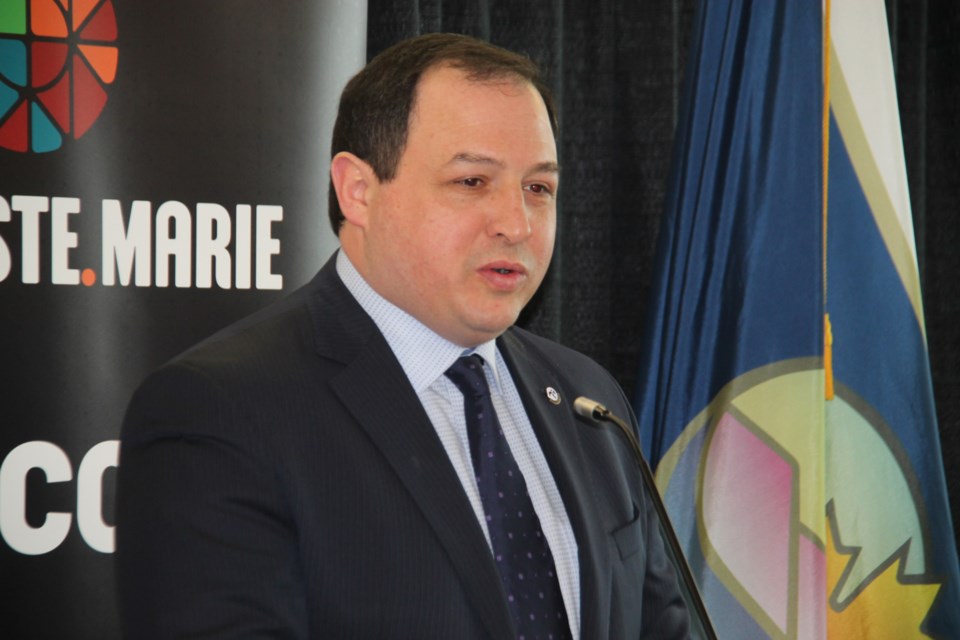It’s only referred to briefly in a massive, 739-page document, but the federal government’s budget announced Monday promises to "work to make FedNor a standalone regional development agency and strengthen the economic development of Northern Ontario.”
“It’s good news,” said Sault Ste. Marie Mayor Christian Provenzano, speaking to SooToday Monday evening.
“In 2016 we specifically asked for this and recently we sent a letter to (Sault MP) Terry Sheehan. It would make FedNor its own economic development agency, just like the Atlantic Canada Opportunities Agency and FedDev in southern Ontario.”
“It’s a good news story. It’s something we’ve been asking for and I want to commend Terry Sheehan for helping to deliver on it, and I want to thank Minister (Melanie) Joly for supporting the idea."
Joly is minister of economic development and official languages and minister responsible for FedNor, while Sheehan is Joly’s parliamentary secretary.
Sheehan was not available for comment Monday.
The budget includes a $12-billion extension of COVID-19 business aid programs and other income supports.
Provenzano said he is pleased with government aid for businesses hit hard by COVID-19 restrictions.
“It (funding from that $12 billion package) assists the business community, which is one of our primary concerns right now," Provenzano said.
There are a lot of entrepreneurs and business owners who are naturally and understandably struggling, and I think it’s critical that the federal government supports them through these challenging times, so I was glad to see those funds made available, and I hope that they are helpful to our business community and our business community can access them.”
Another $2.2 billion will be injected into infrastructure for municipalities and First Nation communities on top of what communities already receive in Federal Gas Tax Fund revenue. Provenzano said, “that’s a positive.”
The government said it will put $17.6 billion toward a green economic recovery.
“They did reference foundational industries in the country, and one of them that they referenced was steel, and I was happy to hear that," Provenzano said.
It was clear there are funds in the budget to help industries and businesses reduce their carbon footprint and that’s positive, and I certainly hope that companies like Algoma are able to access those funds to accelerate an improvement of their systems so that they can reduce their CO2 emissions."
“I think the Canada-wide childcare program is a really good initiative that will be positive for all communities across the country,” Provenzano added, pointing to the government’s proposal to spend $30 billion on childcare over the next five years.
Childcare, along with COVID relief, is a key part of the budget.
The Liberals need the support of one opposition party in Parliament for the budget to be passed.
Another budget item that caught Provenzano’s eye is $424 million in 2021-22 for the “safe reopening” of Canada’s borders.
That will be done through funding more air travel protections and mandatory quarantine measures.
“When we reopen the borders in 2021, 2022, whenever that happens, it’s a safe reopening of the borders. I was really glad to see Canada was focused on that issue," he said.
"It’s something the City of Sault Ste. Marie has been really focused on and active about and I’m glad to see there are specific monies earmarked to make sure the border opens safely.
“I’m generally favourable of the efforts that they’re (the government) is making,” Provenzano said.
Rory Ring, CEO of the Sault Ste. Marie Chamber of Commerce, applauded the government's continuation of wage subsidies and rent subsidies for businesses and employees affected by COVID.
Those business and employee aid programs have been extended into the fall of 2021.
“It’s good to hear from them there’ll be some flexibility there,” Ring said.
Additionally, $1 billion in new spending will go toward the battered tourism industry.
Of that, $500 million will go to a tourism relief fund, with other funds going to things such as festivals, community cultural events and rural fairs.
“A billion dollars is very important to us in Northern Ontario. It’s hopeful that we’ll be able to tap into some of that,” Ring said.
The Chamber CEO added he is also enthused over the government’s plan to put $1 billion into a fund for improving high-speed communications in rural and remote areas (broadband), bringing their total investment in that sector to $2.75 billion by 2026.
‘How’s the Internet access?’ is one major question new home buyers, looking to resettle in Sault Ste. Marie, are asking realtors.
However, Ring said he would have liked to have seen some more help for the restaurant industry, now limited to takeout only.
“How much benefit is there for tourism and a restaurant if all you’ve got is takeout and curbside, when you have somebody who’s coming to a community for an experience, which is what tourism is all about, and if you’ve been operating a hotel at 20 or 30 per cent capacity and you’ve got 180 rooms?" he said.
"That’s a lot of overhead you have to carry.... We really haven’t seen anything beyond continued wage subsidy.”
Ring said it is critical to get the number of vaccinations up in order to get the economy and the Canada-U.S. border reopened.
The budget, announced by Deputy Prime Minister and Finance Minister Chrystia Freeland, is a big one, the federal government’s first in two years.
Highlights include:
- Extension of wage and rent subsidies to COVID-affected businesses and employees to the fall of 2021
- $30 billion over five years for a national child care program, with continued funding after that first five year period.
- $101 billion in new spending over three years to restart the economy
- $18 billion for Indigenous communities
- $17 billion for a green recovery, focusing on conservation and cutting emissions
– SooToday




